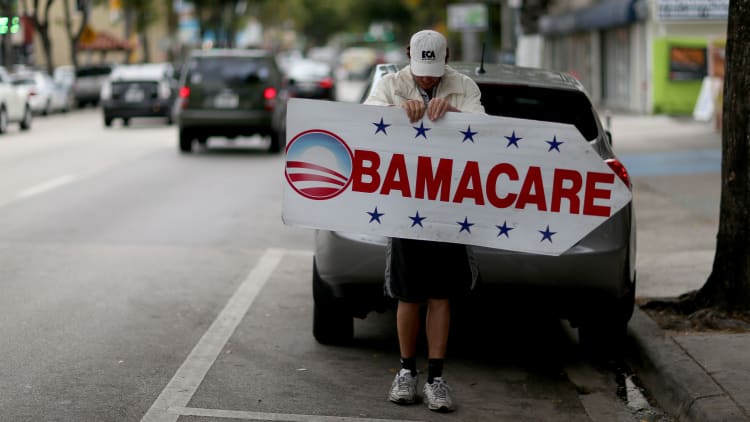
As a potential repeal of the Affordable Care Act looms with no clear replacement, many experts are already painting a dire portrait of what that may mean for Americans: One million lost jobs, longer workdays, and delayed retirement.
More from NBC News:
So what if the Dow is almost at 20,000?
Wage growth surged to a 7-year high in 2016
Economy added 156,000 jobs last month vs 178,000 expected
Job losses
The repeal could result in an estimated 1 million jobs lost in the healthcare industries, according to a computer model from George Washington University and the Commonwealth Fund that simulated what would happen if just the tax credits and Medicare expansions were rolled back.
Already, the Advisory Board Company, a large D.C.–based health care consultancy, has announced restructuring and 220 layoffs. Trump's win has created uncertainty in the market and some healthcare providers are playing defense until they know what's coming.
"The Company experienced a difficult healthcare sales environment across the second half of the year, which was especially pronounced in November and December following the election, as members reassessed their strategy and path forward," said the Advisory Board in a press release. It predicted it would fall short of revenue expectations for the fourth quarter.
Less spending
Obamacare effectively created 20 million new insured patients. A repeal would mean those millions of people no longer receive funds from the Medicaid expansion and subsidy, which means they will have less to spend. That would lower demand for healthcare and the number of people to supply it, with ripple effects that will include nurses, health technicians, and other medical personnel.
"Given that our hospitals already operate with no margin on average, it's hard to see how they could avoid layoffs if a repeal increases uncompensated care," Beth Feldpush, senior vice president of policy and advocacy at America's Essential Hospitals, told Forbes.
Others argue that fewer health care jobs are not necessarily a negative.
"If you want healthcare to consume less of the economy, it's a good thing," said Brian Blase, a senior research fellow at the Mercatus Center at George Mason University, a right-wing think tank.
Regulation and anxieties over it aren't the only forces driving demand up or down, said Gary Burtless, an economist at the left-leaning Brookings Institution. As the population ages, it's going to demand more health services.
"A lot of the care of older Americans is paid by Medicare and old-fashioned Medicaid. It's a little hard to imagine the GOP will deeply cut popular benefits under those old programs," said Burtless.
Longer hours
But experts say the biggest impact, beyond that to the healthcare industry itself, would be the drive by lower-wage workers to work more, and longer, hours.
According to the Congressional Budget Office and the Joint Committee on Taxation, Obamacare effectively increases take-home pay for low-income workers, making it easier to retire or stop working, or to work fewer hours. Get rid of it and the opposite will happen, said the CBO.
In a recent report, they estimated repealing Obamacare would result in a 1.5 percent increase in aggregate hours worked during the period from 2021-2025.
No 'employer mandate'
Without Obamacare, companies with 50 or more employees would no longer be required to give insurance to employees who worked more than 30 hours a week. Nor would they be required to keep kids on their parents' insurance plans until they're 26. Other mandatory perks like free contraceptives and colonoscopies would disappear. Businesses could decide whether to keep these benefits for workers or keep the savings.
"Repeal Obamacare, and businesses can bring down health insurance costs," said Blase. Potentially, they could invest that in jobs. Or not.
Because, in the final result, it's hard to guess what might be the theoretical result of an undetermined event.

